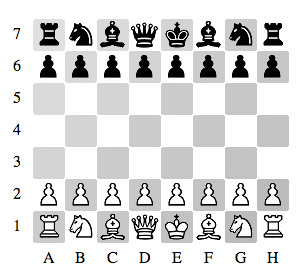Simplified Chess
Simplified Chess removes thousands of years of patchwork rules from what is at essence a very simple game. By making seven minor rule changes, the game becomes infinitely easier to teach but loses nothing in terms of depth of play. The fact that there are no studied openings (as of this writing) means that even very well studied FIDE chess players will be on equal tactical and strategic footing with more spontaneous players. Removing rules to make a game better is nothing new. I hope you find the rules I've removed to have resulted in a better game.
Setup
The board is like the standard 8x8 FIDE Chess board. The exception is that the last row is removed. This leaves a 7x8 board, with all the Black pieces moved forward one space. Note that this will result in the Kings both being on Black squares. There are no other special set up considerations.
There are no other special set up considerations.
Pieces
You only need the standard FIDE Chess 32 piece set. You do *not* need extra pieces for promotions.
Rules
There areNotes
The rules for this variant are so simple you can teach it to children without having to resort to removing all kinds of rules ... wait ... I already did that. It will also appeal to standard players because of its unique configuration and combative style. There is a very unique feel to the game that seasons players will appreciate. Of the rules that were cut from FIDE, I attempted to examine the ones that created the most bizarre moves. For example the pawn is the most complicated piece in the game with the following rules applied: " 1. The pawn may move forward to the unoccupied square immediately in front of it on the same file, or 2. on its first move the pawn may move as in (a); alternatively it may advance two squares along the same file provided both squares are unoccupied, or 3. the pawn may move to a square occupied by an opponent`s piece, which is diagonally in front of it on an adjacent file, capturing that piece. 4. Ad. A pawn attacking a square crossed by an opponent`s pawn which has advanced two squares in one move from its original square may capture this opponent`s pawn as though the latter had been moved only one square. This capture is only legal on the move following this advance and is called an `en passant` capture. 5. When a pawn reaches the rank furthest from its starting position it must be exchanged as part of the same move for a new queen, rook, bishop or knight of the same colour. The player`s choice is not restricted to pieces that have been captured previously. This exchange of a pawn for another piece is called `promotion` and the effect of the new piece is immediate. " Phew! All this for what is considered the lowest value piece in the game. My first experiment with this was to simply remove the rules above on an 6x8 board, but this ended disastrously. The Bishops were aimed directly at the Rooks and every pawn move was an immediate attack. Then I did the unthinkable. I made an odd number of rows. It had a strange effect on the way the game was played. With a middle row, there was a friction to the middle of the board that isn't there in FIDE Chess and which feels deceptively easy but then pulls on you. That middle space is both no-man's land and vital ground and the fight for it is at the end the fight for the game.
 This 'user submitted' page is a collaboration between the posting user and the Chess Variant Pages. Registered contributors to the Chess Variant Pages have the ability to post their own works, subject to review and editing by the Chess Variant Pages Editorial Staff.
This 'user submitted' page is a collaboration between the posting user and the Chess Variant Pages. Registered contributors to the Chess Variant Pages have the ability to post their own works, subject to review and editing by the Chess Variant Pages Editorial Staff.
By John Kipling Lewis.
Web page created: 2008-05-07. Web page last updated: 2008-05-07
